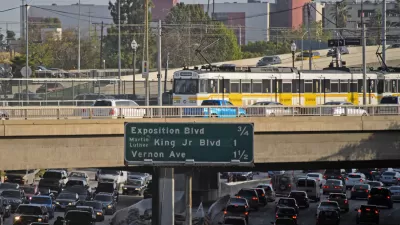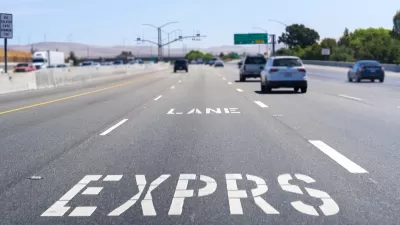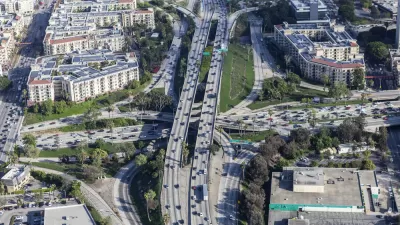Road pricing has its faults as a revenue measure, but it needs to be compared to ten elements of the current system of paying for transportation, including hidden subsidies, says Joe Cortright, an urban economist with Portland-based City Observatory.

"Congestion pricing is a regressive policy," writes Steve Hymon, a blogger on staff for the Los Angeles County Metropolitan Transportation Authority (Metro), to summarize the opinions of many public and private conversations about a congestion pricing proposal under consideration in Los Angeles. Metro CEO Phil Washington suggested congestion pricing to implement some form of congestion pricing to help pay for new transportation projects and to deliver more of the projects in time for the 2028 Olympics.
Hymon also added: "But it’s a fee with associated progressive benefits: better transit, less pollution, fewer greenhouse gas emissions and time (and thus money) savings for many people, to name four."
With the release on Jan. 29 of a new study written by TransForm, a sustainable transportation advocacy group based in Oakland, Calif., with assistance from the Natural Resources Defense Council, road pricing, particularly cordon area congestion pricing and high occupancy toll (HOT) or express lanes, have been receiving more attention, which is a good thing because the study addresses one of the biggest perceived flaws of the policy, its impact on lower-income motorists.
As Planetizen blogger Todd Litman recently posted about the road pricing–equity study, "[r]oad pricing can be more equitable than other transportation funding options, such as property and sales taxes, and even fuel taxes." That was the essence of a commentary last month by Joe Cortright in City Observatory
"Don’t decry congestion pricing as inequitable until after you fix, or at least acknowledge, these ten other things that are even more inequitable about the way we pay for transportation," writes Cortright.
- Fixed, annual registration fees can charge lower rates to wealthier households with more road damaging vehicles
- Not pricing roads, which results in slower bus speeds, which disproportionately affects lower-income commuters. "As we’ve documented at City Observatory, low-income workers are far less likely to drive at all, and much less likely to drive to work during peak commuting hours than are high-income workers. The average income of peak hour car commuters in Portland, for example, is $74,000, compared to $45,000 for transit riders."
- The storm sewer subsidy: "Impervious surfaces like roadways account for up to half of urban stormwater, and much, if not most of the toxic material in stormwater comes from cars (leaking oil, tire residue, brake material, precipitated air pollutants). But roads (and therefore cars and car users) generally contribute nothing to the cost of collecting or treating stormwater: the entire cost is usually added to city sewer and water bills."
- Auto insurance, a requirement, offer rates "are not discounted for the poor. If anything, there is abundant evidence that both the poor and urban residents pay more for car insurance."
- Gas taxes are "not pro-rated by income. Low-income households pay the same per gallon tax as high-income households. Gas taxes, as a result, tend to be much more regressive than other forms of taxation. That’s just as inequitable, on its face, as congestion pricing, yet we’ve never seen a serious argument that we ought to discount the price of gasoline for poor households."
- Federal tax credits and state rebates for the purchase of new electric vehicles: "Giving $7,500 tax credits to households who are rich enough to afford a new Tesla (MSRP: $46,000) isn’t equitable. (Some 200,000 Tesla owners have already gotten the credit, which will now be dialed back to $3,750 per car). Doubtful that any poor families qualified."
- Paid parking: parking meters don’t charge different rates to users based on their income.
- “Free” parking: "As we wrote in our commentary on the triumph of parking socialism, the law in its majesty provides free parking to everyone, whether they own a vehicle or not. As a practical matter, “free” parking, like free roads, benefits those with higher incomes who can afford and who use cars extensively."
- The property tax exemption for cars. "Unlike houses and other forms of real property, cars are seldom charged property taxes...and disproportionately rewards those who own expensive newer cars."
- What if autos paid a proportionate e-scooter fee? Last year, Portland "required the scooter companies to pay $1 per scooter per day to cover the cost of streets. As we noted at City Observatory, ...[i]f cars were charged proportionately to scooters relative to their weight or value, cars should be paying $10 or $20 per day to drive in the city."
Cortright's takeaway:
If we’re going to talk about equity, let’s not apply it to one isolated part of the transportation system. Instead, let’s ask what it takes to create an overall system that is fair to all, considering all aspects of how the system is paid for, who benefits, and who bears the external costs (of things like crashes, air pollution and runoff). If we do, congestion pricing can be at the heart of a system that is both more efficient and fair.
Related in Planetizen:
-
Road Pricing Equity Report and Toolkit, Feb. 01, 2019
- Attacking Auto-Dependency by Attacking Auto Subsidies, July 22, 2018
It's not the car but the driving subsidy that is responsible for many of the ills associated with auto dominance, argues Joe Cortright.
- Defending Road Pricing from Public Opinion, July 17, 2017: Access Magazine takes a deep dive into congestion management, explaining the reasoning behind a publicly unpopular strategy: road pricing.
- Congestion Pricing: The Key to Better Transit? May 3, 2012: Noah Kazis of Streetsblog describes the explosive success of transit systems in London, Stockholm, and Singapore, and suggests that charging motorists for road use is the secret ingredient that keeps ridership high and public support strong.
FULL STORY: Ten things more inequitable than road pricing

Montreal Mall to Become 6,000 Housing Units
Place Versailles will be transformed into a mixed-use complex over the next 25 years.

Planetizen Federal Action Tracker
A weekly monitor of how Trump’s orders and actions are impacting planners and planning in America.

DARTSpace Platform Streamlines Dallas TOD Application Process
The Dallas transit agency hopes a shorter permitting timeline will boost transit-oriented development around rail stations.

Without International Immigrants, the Rural US Population Would Be Falling 58%
Census data shows that population growth in rural areas is due in large part to international migrants.

Dead End: Nine Highways Ready for Retirement
The Freeways Without Futures report describes the nation’s most promising highway removal proposals.

Congressman Proposes Bill to Rename DC Metro “Trump Train”
The Make Autorail Great Again Act would withhold federal funding to the system until the Washington Metropolitan Area Transit Authority (WMATA), rebrands as the Washington Metropolitan Authority for Greater Access (WMAGA).
Urban Design for Planners 1: Software Tools
This six-course series explores essential urban design concepts using open source software and equips planners with the tools they need to participate fully in the urban design process.
Planning for Universal Design
Learn the tools for implementing Universal Design in planning regulations.
City of Mt Shasta
City of Camden Redevelopment Agency
City of Astoria
Transportation Research & Education Center (TREC) at Portland State University
City of Camden Redevelopment Agency
Municipality of Princeton (NJ)
Regional Transportation Commission of Southern Nevada





























